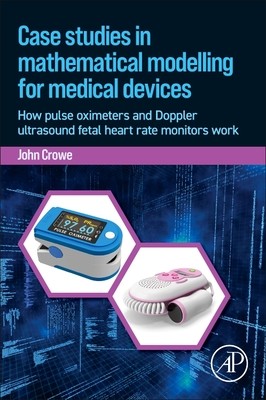
- We will send in 10–14 business days.
- Author: John Crowe
- Publisher: Academic Press
- ISBN-10: 0323954723
- ISBN-13: 9780323954723
- Format: 15.2 x 22.9 x 2.3 cm, softcover
- Language: English
- SAVE -10% with code: EXTRA
Case Studies in Mathematical Modelling for Medical Devices (e-book) (used book) | bookbook.eu
Reviews
Description
Case Studies in Mathematical Modelling for Medical Devices: How Pulse Oximeters, Laser Doppler Flowmeters and Fetal Monitors Work focuses on three medical devices used to monitor some aspect of physiological status: pulse oximetry, laser Doppler flowmetry and Doppler ultrasound fetal heart rate monitoring. The book's three case studies serve as the basis for readers to be able to generalize modeling to other medical devices. It introduces mathematical topics that appear in many areas of science and engineering by demonstrating the value of being able to model how devices work. This requires a brief description of their operating principles before appropriate mathematics.
Containing three parts about each medical device, the book begins with a chapter on probability distributions that will be used in oximetry and laser Doppler flowmetry parts. This book is for MSc and PhD students in biomedical engineering and those interested in the mathematics behind the design of the instrumentation that they use.
EXTRA 10 % discount with code: EXTRA
The promotion ends in 20d.10:00:09
The discount code is valid when purchasing from 10 €. Discounts do not stack.
- Author: John Crowe
- Publisher: Academic Press
- ISBN-10: 0323954723
- ISBN-13: 9780323954723
- Format: 15.2 x 22.9 x 2.3 cm, softcover
- Language: English English
Case Studies in Mathematical Modelling for Medical Devices: How Pulse Oximeters, Laser Doppler Flowmeters and Fetal Monitors Work focuses on three medical devices used to monitor some aspect of physiological status: pulse oximetry, laser Doppler flowmetry and Doppler ultrasound fetal heart rate monitoring. The book's three case studies serve as the basis for readers to be able to generalize modeling to other medical devices. It introduces mathematical topics that appear in many areas of science and engineering by demonstrating the value of being able to model how devices work. This requires a brief description of their operating principles before appropriate mathematics.
Containing three parts about each medical device, the book begins with a chapter on probability distributions that will be used in oximetry and laser Doppler flowmetry parts. This book is for MSc and PhD students in biomedical engineering and those interested in the mathematics behind the design of the instrumentation that they use.


Reviews